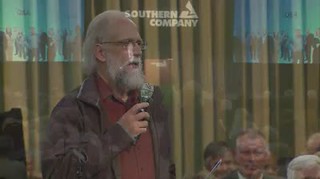Utility backers in the Georgia legislature tried scare tactics to stop HB 657 (or anything else) from requiring more solar power from Georgia Power. Still no solar tax, said citizens in Savannah, Columbus, Gainesville, Athens, and now Atlanta.
Walter C. Jones wrote for the Florida Times-Union 31 October 2013,
Outlook for solar bill isn’t bright in Georgia.
 Not sure why
this picture of me illustrates this story on facebook
(I wasn’t at the hearing in Atlanta),
but hey, why not.
Not sure why
this picture of me illustrates this story on facebook
(I wasn’t at the hearing in Atlanta),
but hey, why not.
Claudia Collier with Green Georgia drove from Savannah to speak at the hearing.
“This bill will give us direct choice in where our electricity comes from,” she said.
Rep. Mike Dudgeon, R-Johns Creek, pointed to the amount of solar generation the Public Service Commission ordered Georgia Power to acquire this year.
“It looks like the PSC is already managing the situation,” he said.
 As
Southern Company CEO Tom Fanning and Georgia Power CEO Paul Bowers
well know, even when Georgia Power deploys
that additional 525 megawatts of solar power,
it will still only be finally matching what
New Jersey has deployed right now.
That
525 megawatts
doubled
last year’s 210 megawatts,
and if sunny Georgia is going to catch up with northern New Jersey
and solar world leader far northern Germany,
Georgia Power needs to keep doubling every year.
As
Southern Company CEO Tom Fanning and Georgia Power CEO Paul Bowers
well know, even when Georgia Power deploys
that additional 525 megawatts of solar power,
it will still only be finally matching what
New Jersey has deployed right now.
That
525 megawatts
doubled
last year’s 210 megawatts,
and if sunny Georgia is going to catch up with northern New Jersey
and solar world leader far northern Germany,
Georgia Power needs to keep doubling every year.
If Georgia Power doesn’t, people will find ways anyway to put
solar panels on their roofs, and, as
electric utility think tank Edison Electric reported earlier this year,
 that is a disruptive development that will burn the utilities’
cozy century-old baseload capacity business model.
Moore’s Law for solar is going to
keep driving solar deployments up like compound interest,
if not in Georgia, in other states like Michigan and New Jersey.
Eventually Georgia Power and Southern Company will have to
stop dragging their feet and catch up.
And catching up will require building out solar faster
than
the current 65% a year compound deployment rate.
that is a disruptive development that will burn the utilities’
cozy century-old baseload capacity business model.
Moore’s Law for solar is going to
keep driving solar deployments up like compound interest,
if not in Georgia, in other states like Michigan and New Jersey.
Eventually Georgia Power and Southern Company will have to
stop dragging their feet and catch up.
And catching up will require building out solar faster
than
the current 65% a year compound deployment rate.
Why not now? As Tom Fanning suggested at the Southern Company stockholder meeting back in May:
Another way to think about those resources, John — and we’re just considering all this right now in this tiger team — is the idea to think about a rooftop not as a customer-owned or “we own” kind of resource, but as a potential site. And what we’ll pay the home is a site lease. Isn’t that interesting?
 Yes, very interesting.
If I could have just had the power company (Colquitt EMC in my case)
finance and install solar panels on my roof, I probably would have
gone for that instead of jumping through all sorts of hoops to get
financing and still getting only 4.5 cents per kilowatt hour for
the excess electricity
I sell instead of the 10 cents I pay to CEMC.
The success of SolarCity, which Fanning and Bowers are watching very closely,
indicates that many people would go for that.
Yes, very interesting.
If I could have just had the power company (Colquitt EMC in my case)
finance and install solar panels on my roof, I probably would have
gone for that instead of jumping through all sorts of hoops to get
financing and still getting only 4.5 cents per kilowatt hour for
the excess electricity
I sell instead of the 10 cents I pay to CEMC.
The success of SolarCity, which Fanning and Bowers are watching very closely,
indicates that many people would go for that.
Back to Atlanta yesterday:
Kidd admitted he’s no expert on solar power but that he sees the bill as an opportunity for rural landowners to lease their property to solar companies, creating jobs and income for rural counties.
Hey, there’s an idea! let the sunshine bring jobs to rural counties that need them.
 The sun is already rising on Georgia.
Not even Georgia Power can stop that.
The sun is already rising on Georgia.
Not even Georgia Power can stop that.
-jsq
Short Link:
Pingback: Southern Company missed earnings: weather and Kemper Coal and nuclear Plant Vogtle | On the LAKE front